Els mínors de la UPF
6. On campus
Minors at UPF: an educational project to adapt to a changing world
The degree and masters students at the University will now be able to obtain a qualification that will certify knowledge and skills acquired outside of their main studies.
 This academic year 2018-2019, UPF generalizes the minor programmes, a complete complementary course based on the acquisition of specific skills in a field of knowledge other than that which constitutes the main studies of any UPF degree or masters student.
This academic year 2018-2019, UPF generalizes the minor programmes, a complete complementary course based on the acquisition of specific skills in a field of knowledge other than that which constitutes the main studies of any UPF degree or masters student.
“Regulated studies here are mostly based on closed circuits and training itineraries that have preset pathways and aims and which are delimited by an official syllabus”, says Cristina Gelpí, vice-rector for teaching projects at UPF.
According to Cristina Gelpí, “Although the degrees at UPF have a relatively strong optional component, and within the degrees there is a mostly cross-disciplinary and interdisciplinary perspective, the margin the student has for learning about other fields which are not directly related to their studies is limited, thanks to the restrictions imposed by their curriculum”. However, the minors at UPF, approved by regulations of the Board of Governors in April 2018, have been designed to change this trend.
The “minor” is very common in English-speaking education systems, where there is also a “major”
The term “minor” is very common in English-speaking education systems, where there is also a “major”. In these systems, study programmes do not usually have a closed syllabus, as we do in our country, but rather it is the students themselves that organise their main educational pathway (the major) and they combine it with one or more complementary, cross-disciplinary and interdisciplinary courses (the minors). Here we ought to draw the distinction between minors and what is known in Catalonia as a menció, which would be the equivalent of the American or British “major”, an option to specialise within the student’s main study programme.
The natural evolution of Free-Elective Cross-disciplinary Training
The two main reasons why the University is introducing its minors programme are, firstly, to expand the students’ competence framework, and secondly, to give visibility to and recognise the academic training students acquire at UPF beyond their official studies. But the minors have not just appeared by chance. They are, as Cristina Gelpí tells us, “the formalised expression of certain key aspects of UPF’s education model and the result of the direction in which the University is developing”. So it could be said that they are an evolution of the Free-Elective Cross-disciplinary Training programme (FTLE), which the University launched in 2016-2017 to allow students to study a subject area which did not form part of their curriculum.
But the minors have not just appeared by chance. They are, as Cristina Gelpí tells us, “the formalised expression of certain key aspects of UPF’s education model and the result of the direction in which the University is developing”. So it could be said that they are an evolution of the Free-Elective Cross-disciplinary Training programme (FTLE), which the University launched in 2016-2017 to allow students to study a subject area which did not form part of their curriculum.
Unlike the free-elective cross-disciplinary training, which figures on the student’s academic transcript as optional credits, the minor is seen as a qualification in its own right separate from the transcript
However, unlike the free-elective cross-disciplinary training, which figures on the student’s academic transcript as optional credits, the minor is seen as a qualification in its own right separate from the transcript.
Alongside the FTLE, the University had already been running a specific minors programme for the Open Bachelor’s Degree programme since 2017. Subsequently, as a result of reflecting on the UPF’s education model, “the need arose naturally to expand the minor concept and open it to all students enrolled on one of the UPF’s official study programmes”, explains Pilar Medina, coordinator of the Special Academic Activities Programme and coordinator of the Open Bachelor's Degree Programme.
Content and typology of the mínors
Pilar Medina outlines the main characteristics of the minors: “They could be subject-based, cross-disciplinary or for specific collectives; the credits they offer varies between 12 and 30; they can consist of a diverse range of training activities, including regular subjects, specific courses, activities with or without academic recognition. And ideally, in the future, students will be able to configure their own minors”.
The minors within the EDvolution framework, the UPF’s education model
“EDvolution, the reflection on the education model launched by Pompeu Fabra, is based on flexible, cross-disciplinary and interdisciplinary learning, emphasises collaborative work, open formats and autonomous study; and has a view to professionalisation and connecting teaching and research. Many of these characteristics are also intrinsic to the minors at UPF”, Cristina Gelpí points out. According to the vice-rector for teaching projects, the minors are flexible both because they are developed following different organisational models and because they are the expression of a desire to offer educational solutions beyond conventionally structured study programmes. They can be cross-disciplinary and interdisciplinary, both in the way they are set up and, especially from the student’s viewpoint, as they allow them to choose from a wide and varied subject offer and to receive training in a field of knowledge other than that of their main study programme.
According to the vice-rector for teaching projects, the minors are flexible both because they are developed following different organisational models and because they are the expression of a desire to offer educational solutions beyond conventionally structured study programmes. They can be cross-disciplinary and interdisciplinary, both in the way they are set up and, especially from the student’s viewpoint, as they allow them to choose from a wide and varied subject offer and to receive training in a field of knowledge other than that of their main study programme.
“A student’s learning is necessarily cross-disciplinary, because they have to be able to apply knowledge and the skills they acquire to all aspects of their personal, social and working lives”
“When we think about cross-disciplinarity, we need to think about the challenges we have to face, and which the graduates will have to face. These are complex and demand different competences and conceptual approaches to overcome them. A student’s learning is necessarily cross-disciplinary, because they have to be able to apply knowledge and the skills they acquire to all aspects of their personal, social and working lives”, stresses Cristina Gelpí.
One of the minors that best represents this cross-disciplinarity is the minor in Plurilingualism, which together with the Gender Studies minor, are the last (the offer will be gradually expanding) to be approved by the University. “Students that have received a good education in languages have an asset, which could be applied to any activity they decide to embark on”, assures Cristina Gelpí.
The Gender Studies minor, a strategic proposal of the University, enables the acquisition of multiple competences
The minor in Gender Studies is an example of a multidisciplinary and interdisciplinary minor (because of the diversity of approaches and disciplines from which gender studies can be addressed) which develops academic and professionalising applications from a gender perspective.
“The gender perspective in teaching is one of the five basic pillars of the Second UPF Equality Plan”
As recalled Tània Verge, director of the University’s Equality Unit, “The gender perspective in teaching is one of the five basic pillars of the Second UPF Equality Plan approved in July 2018 and a cross-disciplinary competence of the new education model the University is designing. With this minor we’re responding to a demand from our students, who are asking for training that develops critical thinking and which takes the whole of the population into account”.
How the minors fit into academic records
Mar Gil, head of the Degree Section of the UPF’s Academic Management Service, explains that the minors will be recognised through specific certification: “It’s a different transcript from that of the official study programme, and is complementary to it. As we’ve designed it, the minor does not form part of the student’s degree or masters, although some subjects that form part of a minor and which the student may have on their record as free-elective cross-disciplinary training or RAC credits can count towards obtaining the minor”.
Mar Gil explains that to take a minor, students have to check what activities it includes and how to enrol. Those courses that are official subjects from a study programme must be enrolled on within the established time periods (one each term) which coincide with the enrolment modification periods for the degree programmes. Courses that are not subjects on any official study programme, however, will have their own enrolment process.
Learning in order to adapt to a changing world
The purpose for introducing the UPF minors, comments Cristina Gelpí, is one that is fundamental for students today: “To have access to more than one field of knowledge is personally enriching for students, but it also forms part of the training they receive throughout their academic lives, and is something they’ll need in the professional world they will eventually enter”.
“The university graduates will enter into a diverse, flexible and changing professional world: the professions they are preparing themselves for are subject to constant change”
According to the vice-rector, university graduates will enter into a diverse, flexible and changing professional world: the professions they are preparing themselves for are subject to constant change. It is highly likely that the professions they know now will have changed in the next three or four years and others that we can’t even imagine will have appeared. “That’s why we believe that the best service we can offer our students is to enable them to acquire the tools they need to develop professionally under the best possible conditions in the best of possible professional worlds. And this changing world demands they have training in different fields of knowledge”.
